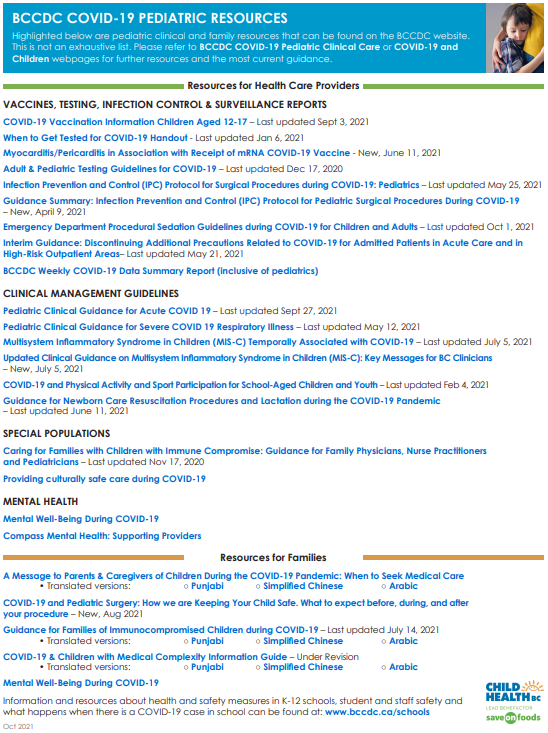Information on COVID-19 in children, infection prevention and control, diagnosis and treatment options.
Testing and infection control
Multisystem inflammatory syndrome in children (MIS-C)
MIS-C continues to be a rare complication of COVID-19 in children.
- It can occur in children who have had asymptomatic or symptomatic COVID-19 infection.
Children affected by MIS-C can present with a spectrum of symptoms.
- Prominent features include shock/hemodynamic instability, rash, mucocutaneous inflammation, peripheral extremity changes, gastrointestinal symptoms and cardiac dysfunction.
- Respiratory symptoms can occur but are less frequent.
Common laboratory features associated with MIS-C include:
- Lymphopenia, thrombocytopenia, elevated inflammatory markers, evidence of coagulopathy and elevated cardiac markers.
MIS-C symptoms overlap with a broad range of conditions.
- It is important to consider other diagnoses with similar presentation to MIS-C including:
- Kawasaki Disease
- Toxic Shock Syndrome
- Sepsis
There should be a low threshold to evaluate for MIS-C in children who present with unexplained fever for three or more days, even if they are well-appearing on initial presentation.
- Although children with MIS-C may appear well, their condition can deteriorate within hours to days.
- Caregivers of children who appear well and are discharged should be counselled about symptoms of MIS-C and told to return to the emergency department if:
- Symptoms worsen;
- Symptoms do not improve within 48 hours; or
- Fever does not abate after a total of five days since onset.
- Clinicians should liaise with the relevant specialist at BC Children’s Hospital regarding the MIS-C patient’s management and determine whether a higher level of care is needed.
The mainstay of MISC-C treatment is:
- Early fluid resuscitation, as needed.
- Intravenous immunoglobulin (IVIg).
- Systemic steroids.
- Consultation with rheumatology, infectious diseases and cardiology is suggested for children being evaluated for MIS-C.
Long-term sequalae of MIS-C is unknown at present but some children may have lingering symptoms after discharge.
Children with possible MIS-C require evaluation by a pediatric specialty team experienced in the diagnosis of KD and other inflammatory conditions of childhood. Consultation with pediatric rheumatology and infectious disease is recommended if querying MIS-C. If cardiac imaging is needed outside of BC Children's Hospital, liaise with the pediatric cardiologist at BC Children's Hospital. Any of these specialists can be reached through central paging at 1-604-875-2000 or toll free 1-888-300-3088.
Cases of MIS-C are reportable under the Reporting Information Affecting Public Health Regulation and Public Health Act. Please contact your local Medical Health Officer to report cases of MIS-C. For MIS-C reporting or questions, please email
MISC@cw.bc.ca.
Special populations
Mental health
Schools
Schools are low-risk settings for COVID-19 transmission. There is widespread support amongst pediatricians to have children attend in-person learning, including most children with medical complexity and/or immune compromise, when safety measures are in place.
Information and resources about health and safety measures in K-12 schools, student and staff safety and what happens when there is a COVID-19 case in school can be found at our
K-12 Schools and COVID-19 website.
Resources for families

Open or print a handout of the resources on this page

